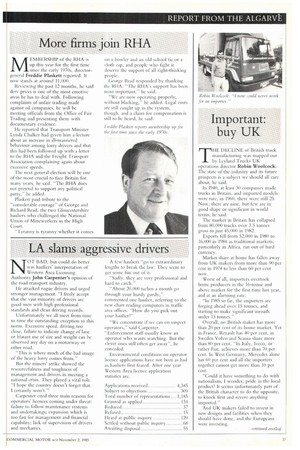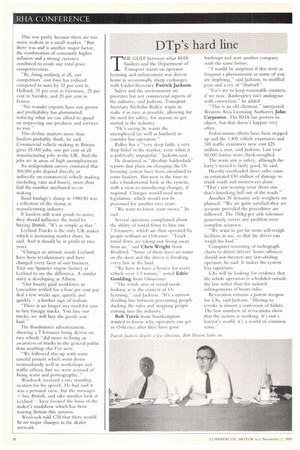Important: buy UK
Page 29

Page 30

If you've noticed an error in this article please click here to report it so we can fix it.
THE DECLINE of British truck manufacturing was mapped out by Leyland Trucks UK
operations director Robin Woolcock. The state of the industry and its future prospects is a subject we should all care about, he said.
In 1940, at least 30 companies made trucks in Britain, and imported models were rare; in 1960, there were still 25. Now, there are nine, but few are in good shape or significant in world terms, he said.
The market in Britain has collapsed from 80,000 trucks over 3.5 tonnes gross to just 45,000 in 1982.
Exports fell from 52,000 in 1980 to 16,000 in 1984 as traditional markets, particularly in Africa, ran out of hard currency.
Market share at home has fallen away from UK makers from more than 90 per cent in 1974 to less than 60 per cent now.
Worst of all, importers overtook home producers in the 16-torme and above market for the first time last year, and at an alarming rate.
"In 1985 so far, the importers are forging ahead over 15 tonnes, and starting to make significant inroads under 15 tonnes."
Overall, no British maker has more than 20 per cent of its home market. Yet in France, Renault has 40 per cent, in Sweden Volvo and Scania share more than 80 per cent. "In Italy, Iveco, or rather Fiat, achieves more than 70 per rent. In West Germany, Mercedes alone has 60 per cent and all the importers together cannot get more than 10 per rent.
"Could it have something to do with nationalism, I wonder, pride in the local product? It seems unfortunately part of the British character to do the opposite, to knock first and revere anything imported."
And UK makers failed to invest in new designs and facilities when they should have done, and the Europeans were investing. This was partly because there are too many makers in a small market. "But there was and is another major factor, the combination of constantly higher inflation and a strong currency combined to erode our total price competitiveness.
"By doing nothing at all, our competitors' cost base has reduced compared to ours by 32 per cent in Holland, 31 per cent in Germany, 25 per cent M Sweden, and 20 per cent in France.
"No wonder exports have not grown and profitability has plummeted, reducing what we can afford to spend on improving our products and services to you."
This decline flatters more than hauliers probably think, he said. Commercial vehicle making in Britain gives 55,000 jobs, one per cent of all manufacturing jobs in the UK. And the jobs are in areas of high unemployment.
An independent survey estimated that 300,000 jobs depend directly or
indirectly on commercial vehicle making (including vans and buses), more than half the number attributed to car making.
Road haulage's slump in 1980/81 was a reflection of the slump in manufacturing industry.
If hauliers still want goods to move, they should influence the trend by buying British. "It's as simple as that."
Leyland Trucks is the only UK maker which is increasing market share, he said. And it should be in profit in two years.
"Changes in attitude inside Leyland have been revolutionary and have changed every facet of our business. Visit our Spurrier engine factory at Leyland to see the difference. A similar story is developing at Albion.
"Our hourly paid workforce in Lancashire settled for a four per cent pay deal a few weeks ago, quietly and quickly — a further sign of realism.
"There is no longer any need for you to buy foreign trucks. You buy our trucks, we will buy the goods you haul."
The Roadrunner advertisement, showing a 7.5-tonner being driven on two wheels "did more to bring an awareness of trucks to the general pubh, than anything else I've seen.
"We followed this up with some tasteful posters which went down tremendously well in workshops and traffic offices, but we were accused of being sexist and pornographic."
Woolcock received a rare standing ovation for his speech. He had said it was a personal view, hut the messages — buy British, and take another look at Leyland — have formed the basis of the maker's roadshow which has been touring Britain this autumn.
Woolcock told CM that there would be no major changes in the dealer network.












































































































